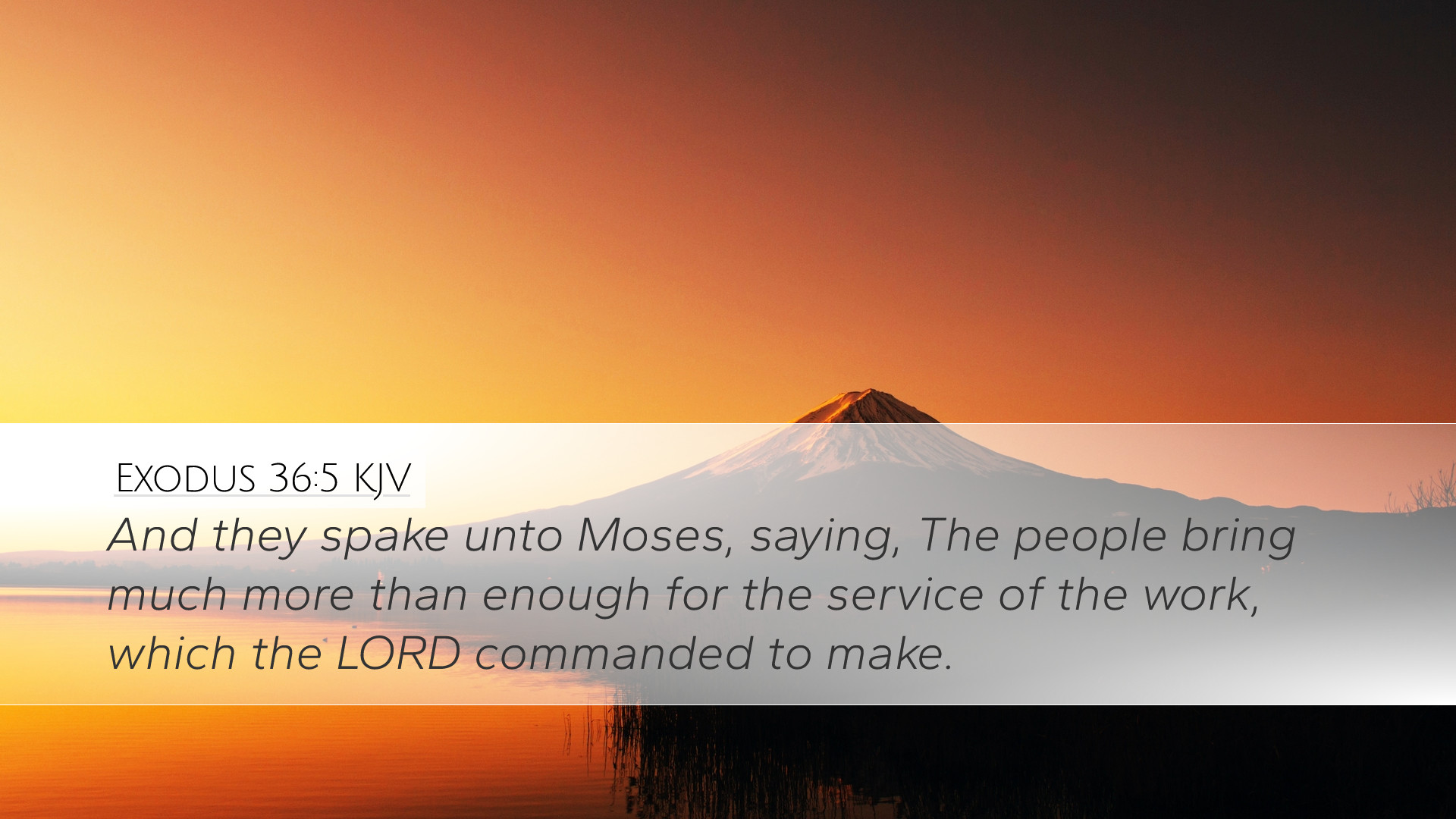Exodus 36:5 - Commentary and Insights
Verse: "And they spake unto Moses, saying, The people bring much more than enough for the service of the work, which the LORD commanded to make."
Introduction
The verse in Exodus 36:5 presents a remarkable moment in the construction of the Tabernacle, showcasing the generosity of the Israelites in response to God's command. This commentary seeks to unravel the theological implications, exhortations, and practical applications of this particular verse.
Thematic Overview
- Divine Command and Human Response: The emphasis on God's commandments highlights the relationship between divine instruction and human action.
- Generosity of the People: This verse shows the spontaneous giving of the Israelites, which serves as an example of communal support for God's work.
- The Role of Leadership: Moses' role in receiving and directing the people's gifts underscores the importance of leadership in spiritual endeavors.
Commentary Insights
Understanding Generosity
Matthew Henry notes that the people were moved to give not out of obligation but from a willing heart. This manifests a significant principle in Christian stewardship, where giving is motivated by gratitude rather than compulsion. Henry emphasizes that the Israelites' response was due to their acknowledgment of the greatness of God’s deliverance — they were thankful for their freedom and wanted to honor Him.
Abundance in God’s Provision
Albert Barnes elaborates on the idea of "much more than enough." He suggests that this reflects God's rich provision for His people. The abundance of contributions is not just a coincidence but a testament to God’s abundant supply, which encourages believers to trust in God's provision, even in meet physical needs. Barnes highlights the theological characteristic of God's work being adequately supported when He commands it.
The Importance of Unity and Community
Adam Clarke addresses the community aspect of this verse. The contributions came from all members of the community, suggesting a deep sense of unity and purpose among the Israelites. Clarke suggests that this communal effort serves as a model for contemporary congregations, demonstrating that the collaborative effort of the church is vital for the fulfillment of God's mandates. The shared vision resulted in collective action, fostering a bond amongst the people.
Theological Reflections
- The Nature of Giving: This passage illustrates that true giving within the church should come from a place of love, joy, and gratitude, serving as an act of worship.
- God’s Purposes Realized through His People: The readiness to give reflects a community that is aligned with God’s purposes, understanding that every contribution is essential for the mission.
- Leadership in Spiritual Matters: Moses exemplifies the role of leaders in guiding the congregation in service and stewardship, inspiring them to act on their faith.
Practical Applications
In light of Exodus 36:5, contemporary congregations and leaders can consider the following applications:
- Encouraging Generosity: Pastors and church leaders should cultivate a culture of generosity by teaching on the value of giving and sharing testimonies of faithfulness and God’s provision.
- Communal Participation: Engage congregants in discussions on the need for teamwork and collaboration, emphasizing that every contribution, no matter how small, serves a greater purpose.
- Modeling Generosity: Leaders should model generosity themselves, setting an example that inspires the congregation to give cheerfully and abundantly.
Conclusion
Exodus 36:5 is a verse rich with implications for understanding divine provision, the heart of community, and the necessary role of leadership in the church. By examining the insights of noted commentators like Matthew Henry, Albert Barnes, and Adam Clarke, we can glean profound lessons on stewardship, responsiveness to God's call, and the collective dynamics of faith in action. May we, like the Israelites, respond to God's commands with open hearts and hands, contributing to the mission He has entrusted to us.


